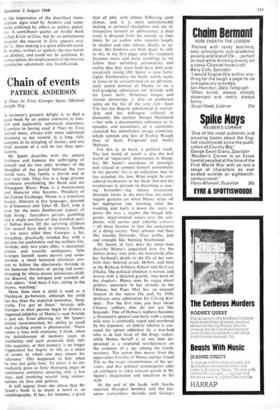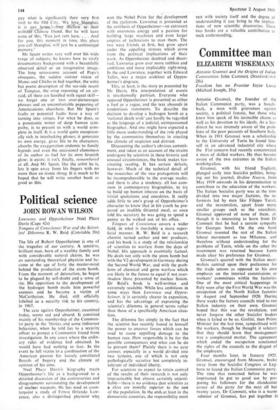Chain of events
PATRICK ANDERSON
A Place In Time Georges Spunt (Michael Joseph 35s) A reviewer's greatest delight is to find a good book by an author unknown to him- self and apparently unnoticed elsewhere. I confess to having read A Place In Time several times, always with some additional discovery as my reward. It is long, rich, complex in its mingling of themes, and any brief account of it will be less than satis- factory.
Mr Spunt describes with the utmost liveliness and humour the upbringing of himself and his two older brothers in the Shanghai of the period between the two world wars. The family is Jewish and at first very rich. They live in a large gloomy penthouse overlooking the Bund and the Whangpoo River; Papa is a businessman and financier who becomes President•' of the Cotton Exchange; Mama is a notorious beauty, illiterate in five languages, devoted to d'Annunzio and Ethel M. Dell, with a taste for the more flamboyant aspects of high living: fancydress parties, gambling and a single purchase of one hundred pairs of Italian shoes. Of the surviving children (for several have died in infancy), Sascha is ten years older than Georges, a fat, masculine, practically minded boy with a passion for conformity and the military life; Aristide, only two years older, is mercurial, artistic and sexually ambiguous; little Georges himself seems passive and unim- portant, a timid bemused character con- tent to follow the charismatic Aristide in the Jamesian business of spying and eaves- dropping by whose means precocious child- ren discover the intrigues and scandals of their elders. 'And there I was, sitting in the alcove, watching.'
More than once a child is used as a Hartleyan go-between, although the child has less than the expected innocence. Stop. cretin, I've got to listen,' Aristide tells Georges as their parents begin to discuss a supposed infidelity of Mama's—and Aristide is just six. Even allowing for Mr Spunt's artistic reconstruction, his ability to recall such exciting events is phenomenal. 'There comes a time with everyone, I think, when the kaleidoscope of memory stops its oscillating and eacb prismatic slide falls into sequence, so that memory is no longer fragmented but begins its life as a chain of events to which one may return for reference.' This happened to him when he was not quite four. To prove it he im- mediately gives us forty thumping pages of continuous narrative, covering only a few days and involving several long conver- sations on love and politics.
It will appear from the above that Mr Spunt's book is as much a novel as an autobiography. It has, for instance, a great deal of plot, with climax following upon climax, and it is most unfashionably lacking in personal revelations and the in- trospective turmoil of adolescence; a deep irony is directed from far outside its time limits by an author who remains largely in shadow and who refuses, finally, to ex- plain. His brothers are both dead; he tells us this in the first pages and the statement becomes more and more troubling as we follow their unfolding personalities and realise that they must both have died com- paratively young (Mr Spunt is now forty- eight). Furthermore the book• which seems at times to be concentrated on an affection- ately comic portrait of Mama, or on a half-grudging admiration for Aristide with his Lenci dolls, flirtatious tangos and rococo posturings, is also an exuburant satire on the life of the very rich—Aunt Tila has her Bugatti upholstered in ostrich- skin and her pekingese collared in diamonds, like another Margot Metroland —but with a documentary substance to its episodes and encounters, or a sometimes expected but nonetheless savage exoticism, which reminds one less of Evelyn Waugh than of Scott Fitzgerald and Andre Malraux.
For this is. at heart, a political work. The lost world of youth is also the lost world of 'imperialist' domination in Shang- hai. Mr Spunt's avoidance of nostalgia and refusal to commit himself emotionally to his parents' life is an indication that he has accepted this loss. What might be con- sidered weaknesses in the book (but not the weaknesses to prevent its becoming a soar- ing bestseller)—the almost excessively dramatic twists in the story-line, the extra- vagant gestures (as when Mama strips off her nightgown one morning after her wedding and hurls it down the stairs to prove she was a virgin), the forged tele- grams, impersonated voices over the tele- phone, wild parties and sybaritic toilettes —all these become in fact the caricatures of a dying society. They splutter and flare like mouldy fireworks. They writhe, jerk and crumple like burning brushwood.
Mr Spunt, in fact, does far more than describe Mama's anguished love for the Italian prince who joins the household after her husband's death, or the life of her sons with their beloved amah, Hoboo, and then at the Richard Ashbury School and the Casa d'Italia. The political situation is woven, and woven with a detailed gravity, into most of the chapters. Mama may be vague about politics, uncertain in her attitude to the Chinese, but Papa Max has an unusual interest in the native life and, by 1926, professes some admiration for Chiang Kai- shek : 'For the first time you hear about Chinese soldiers who do not act like brigands.' One of Hoboo's nephews becomes a Nationalist general and hero, with a young wife who is eventually raped and murdered by the Japanese; an elderly relative is exe- cuted for opium addiction by a war-lord who is in fact head of the drugs racket; while Hoboo herself is at one time im- prisoned as a suspected revolutionary on the evidence of a spy among the family retainers. The action thus moves from the upper-class frivolity of Mama and her friend Tila to the tragic circumstances of the ser- vants; and this political counterpoint adds an astringent to what remains garish in Mr Spunt's imagination and uncertain in his style.
At the end of the book, with Sascha married, Shanghai bombed and the Jap- anese everywhere, Aristide and Georges
pay what is significantly their very first visit to the Old City. 'We love_ Shanghai, it is our laoraeArthey declare to their militle Chinese friend. But he will have none-of this. 'You just rent here. . . . And for you, this moment in time, this place you call Shanghai, will just be a sentimental memory.'
Mr Spunt writes very well over his wide range of subjects; he knows how to vivify documentary background with a beautifully observed detail or an imaginative image. The long serio-comic account of Papa's obsequies, the sudden sinister vision of Mama and Chicho in bed together, the witty but poetic description of the sea-side resort of Tsingtao, the crisp reporting of an air- raid, all these are handled with equal skill— we forget one or two over-picturesque phrases and an uncomfortable peppering of Americanisms elsewhere. But Mr Spunt's faults or potential faults have a way of turning into virtues. For what he does, as a panoramic writer of deep human sym- pathy, is to present us with a world com- plete in itself. It is a world quite exception- ally rich in interlocking planes; it generates its own energy, gives life to its characters, absorbs the exaggeration endemic to family legends and even the occasional clumsiness of its author as fuel for its own feverish glow; it exists; it isn't, finally, remembered at all. And Mr Spunt, like the artist he is, lets it spin away from his fingers with no more than an ironic shrug. It is much to be hoped that he will write another book as good as this.



































 Previous page
Previous page